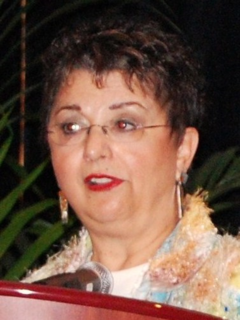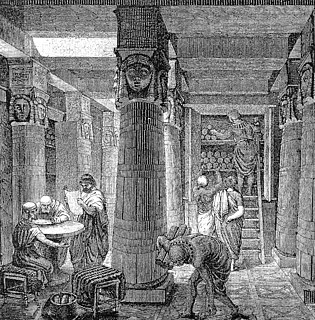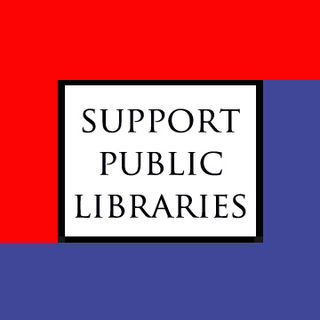Related Research Articles

A librarian is a person who works professionally in a library, providing access to information, and sometimes social or technical programming, or instruction on information literacy to users.
The American Library Association (ALA) is a nonprofit organization based in the United States that promotes libraries and library education internationally. It is the oldest and largest library association in the world, with more than 57,000 members.
Sanford Berman is a librarian. He is known for radicalism, promoting alternative viewpoints in librarianship, and acting as a proactive information conduit to other librarians around the world. His vehicles of influence include public speaking, voluminous correspondence, and unsolicited "care packages" delivered via the U.S. Postal Service. Will Manley, columnist for the American Library Association (ALA) publication, American Libraries, has praised Berman: "He makes you proud to be a librarian."

Library Journal is an American trade publication for librarians. It was founded in 1876 by Melvil Dewey. It reports news about the library world, emphasizing public libraries, and offers feature articles about aspects of professional practice. It also reviews library-related materials and equipment. Each year since 2008, the Journal has assessed public libraries and awarded stars in their Star Libraries program.
Library collection development is the process of systematically building the collection of a particular library to meet the information needs of the library users in a timely and economical manner using information resources locally held as well as resources from other organizations.
Michael Gorman is a British-born librarian, library scholar and editor/writer on library issues noted for his traditional views. During his tenure as president of the American Library Association (ALA), he was vocal in his opinions on a range of subjects, notably technology and education. He currently lives in the Chicago area with his wife, Anne Reuland, an academic administrator at Loyola University.
The following outline is provided as an overview of and topical guide to library science:
Education for librarianship, including for paraprofessional library workers, varies around the world, and has changed over time. In recent decades, many institutions offering librarianship education have changed their names to reflect the shift from print media to electronic media, and to information contained outside of traditional libraries. Some call themselves schools of library and information science, or have dropped the word "library" altogether.

Camila Alire is an American Librarian and was President of the American Library Association from 2009–2010. She was President of REFORMA, National Association to Promote Library and Information Services to Latinos and the Spanish-speaking, in 1993-1994.

Library science is an interdisciplinary or multidisciplinary field that applies the practices, perspectives, and tools of management, information technology, education, and other areas to libraries; the collection, organization, preservation, and dissemination of information resources; and the political economy of information. Martin Schrettinger, a Bavarian librarian, coined the discipline within his work (1808–1828) Versuch eines vollständigen Lehrbuchs der Bibliothek-Wissenschaft oder Anleitung zur vollkommenen Geschäftsführung eines Bibliothekars. Rather than classifying information based on nature-oriented elements, as was previously done in his Bavarian library, Schrettinger organized books in alphabetical order. The first American school for library science was founded by Melvil Dewey at Columbia University in 1887.

Zoia Markovna Horn, born in Ukraine, became in 1972 the first United States librarian to be jailed for refusing to share information as a matter of conscience. Horn, an outspoken member of the American Library Association's Intellectual Freedom Committee, worked at Bucknell University in Lewisburg, Pennsylvania in the early 1970s. Horn was jailed for nearly three weeks for contempt of court after refusing to testify for the prosecution in the 1972 conspiracy trial of the "Harrisburg Seven" anti-war activists.

Clara Stanton Jones was the first African-American president of the American Library Association, serving as its acting president from April 11 to July 22 in 1976 and then its president from July 22, 1976 to 1977. Also, in 1970 she became the first African American and the first woman to serve as director of a major library system in America, as director of the Detroit Public Library.

Public library advocacy is support given to a public library for its financial and philosophical goals or needs. Most often this takes the form of monetary or material donations or campaigning to the institutions which oversee the library. Originally, library advocacy was centered on the library itself, but current trends show libraries positioning themselves to demonstrate they provide "economic value to the community."
Public libraries in the American Colonies can be traced back to 1656, when a Boston merchant named Captain Robert Keayne willed his collection of books to the town.
Librarianship and human rights in the U.S. are linked by the philosophy and practice of library and information professionals supporting the rights enumerated in the Universal Declaration of Human Rights (UDHR), particularly the established rights to information, knowledge and free expression.
The Miriam Braverman Memorial Prize, named after librarian Miriam Braverman, is sponsored by the Progressive Librarians Guild (PLG). The intent of the award is "to celebrate Miriam's spirit of activism and faith in the power of people's collective social justice efforts and inspire future generations of librarians." The Prize is awarded each year for the best graduate student paper about some aspect of the social responsibilities of librarians, libraries, or librarianship. Papers related to archivists, archives, and archival work are also eligible.

The Alice G. Smith Lecture, established in 1989, is sponsored by the University of South Florida, School of Information. The lecture is an annual recognition of a scholar or author whose achievements have been instrumental in the development of librarianship or information studies. The lecture series honors the memory of the School's first director, Alice Gullen Smith, known for her work with youth and bibliotherapy. The Lecture Fund was created with the purpose of memorializing the visionary work of Dr. Smith, who was central to the School's first accreditation by the American Library Association in 1975. Florida Library Association archivist, Bernadette Storck has provided an oral history of the development of libraries in Tampa, Florida that details the contributions of Dr. Smith including her establishment of the Tampa Book Fair that encouraged thousands of children to foster a love for books and reading
The Rainbow Round Table (RRT) of the American Library Association (ALA) is dedicated to supporting the information needs of LGBTQIA+ people, from professional library workers to the population at large. Founded in 1970, it is the nation's first gay, lesbian, bisexual, and transgender professional organization. While the current Rainbow moniker was adopted in 2019, the group has had various names during its 50-year history.
Dewey-free refers to library classification schemes developed as alternatives to Dewey Decimal Classification (DDC). Dewey-free systems are often based on the BISAC subject headings developed by the Book Industry Study Group, and are typically implemented in libraries with smaller collections. Instead of using numerical notation to indicate a document's shelving location, Dewey-free systems organize documents alphabetically by natural language words. Dewey-free systems have been implemented in both public and school libraries.

The Main Library is the primary library of the San Francisco Public Library, located in San Francisco's Civic Center.
References
- ↑ Manley, Will. "Guerrilla librarians." American Libraries, April 1997., 192, Library, Information Science & Technology Abstracts with Full Text, EBSCOhost (accessed November 2, 2009).
- ↑ Wisner, William H. Whither the Postmodern Library? Libraries, Technology, and Education in the Information Age. Jefferson, North Carolina: McFarland and Company, Inc., 2000. ISBN 0-7864-0795-6
- ↑ November 8, 1988 San Francisco Voter Pamphlet
- ↑ Biller, Walter; Kirwan, Jim & Slade, Suzanne. “High Tech Barbarians at the Gates: The Plunder of the San Francisco Public Library.” San Francisco Frontlines, (San Francisco, CA) June 1997. Reprint of San Francisco Frontlines June 1997 Article
- ↑ Soukhanov, Anne H. “Word Watch” The Atlantic Online. April 1997 Word Watch
- ↑ Clash guitarist Mick Jones has become a 'guerrilla librarian'
- ↑ "Reclaiming the bookshelves for reason". TheGuardian.com . August 2007.